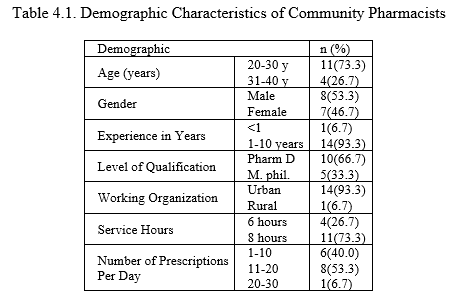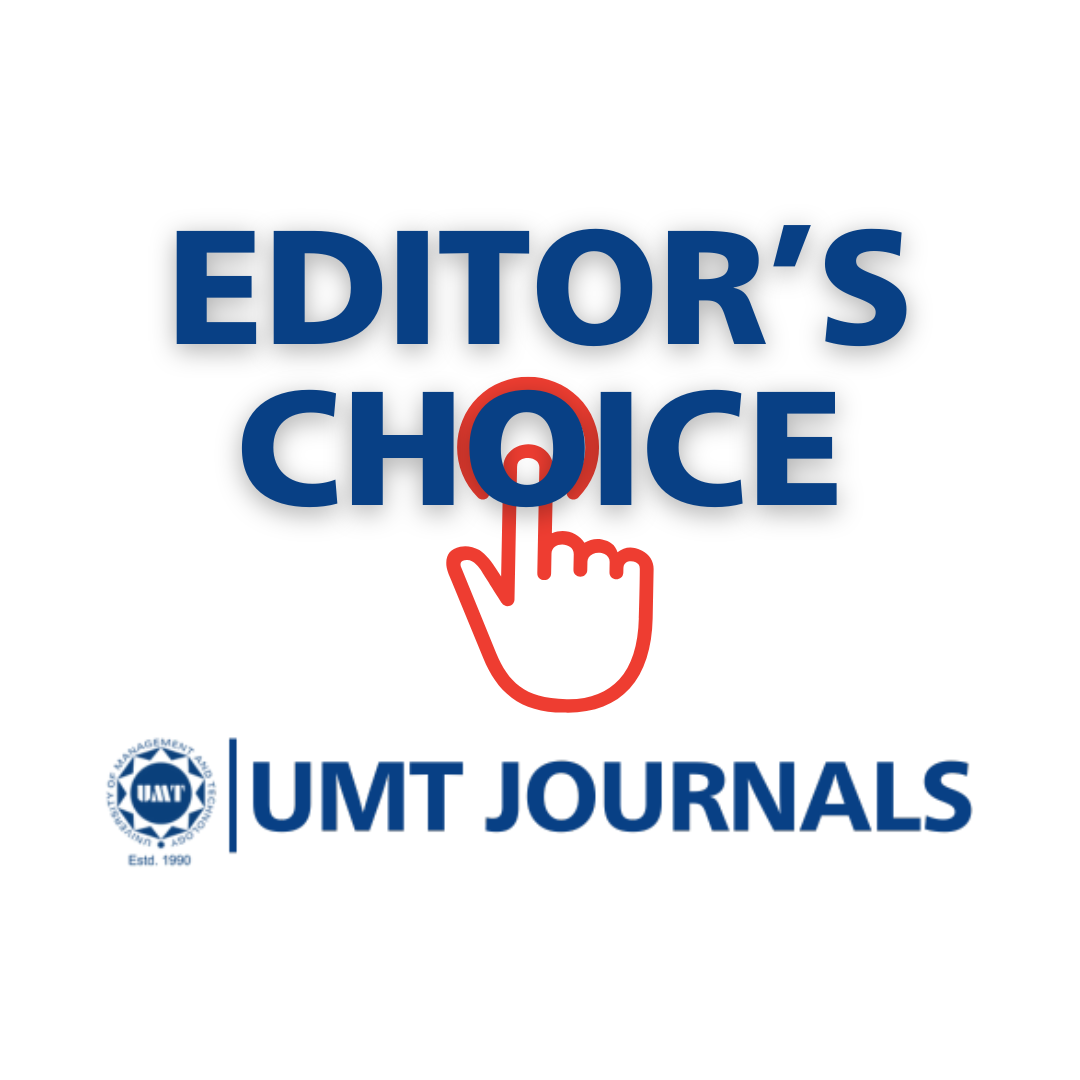Assessment of Knowledge, Attitudes, and Perceptions of Community Pharmacists Regarding Vitamin D and Calcium Products: A Qualitative Study in Islamabad and Rawalpindi, Pakistan
Abstract
 Abstract Views: 0
Abstract Views: 0
The current study explored the level of knowledge, attitudes, and perceptions of community pharmacists concerning the usage of vitamin D and calcium products, employing a qualitative approach in the twin cities of Rawalpindi and Islamabad, Pakistan. Calcium, an equally important mineral, contributes to various physiological processes, including blood pressure regulation, prevention of hypertensive complications during pregnancy, and reduction in cholesterol levels. According to the Pakistan National Nutrition Survey 2018, a significant proportion of urban women of reproductive age suffer from hypocalcemia and vitamin D deficiency. This qualitative investigation involved semi-structured interviews with community pharmacists from Islamabad and Rawalpindi, selected through purposive sampling technique. Thematic analysis was used to interpret the collected data. Pharmacists exhibited mixed levels of awareness regarding the benefits and side effects of calcium and vitamin D supplements. While most acknowledged their role in maintaining bone health and potential side effects, only about half were familiar with drug interactions. A generally favorable attitude was observed towards supplementation. The study highlighted that, although community pharmacists in Pakistan have a basic understanding of calcium and vitamin D supplementation, their knowledge and communication practices vary. They show a positive attitude towards their roles, however, often rely on reactive patient engagement. Strengthening pharmacist training, policy support, and public awareness is essential to effectively address widespread micronutrient deficiencies.
Downloads
References
Saeed AA, Eid M, Ahmed S, Abboud M, Sami B. Knowledge, attitude, and practice regarding vitamin D deficiency among community pharmacists and prescribing doctors in Khartoum city, Sudan, 2020. Matrix Sci Pharma. 2020;4(2):41–44. https://doi.org/10.4103/MTSP.MTSP_8_20
Al-Amri F, Gad A, Al-Habib D, Ibrahim AK. Knowledge, attitude and practice regarding vitamin D among primary health care physicians in Riyadh City, Saudi Arabia, 2015. Food Sci Technol. 2017;1(2):47–55. https://doi.org/10.11648/j.wjfst.20170102.13
Cormick G, Belizán JM. Calcium intake and health. Nutrients. 2019;11(7):e1606. https://doi.org/10.3390/nu11071606
Benedik E. Sources of vitamin D for humans. Int J Vitam Nutr Res. 2022;92(2):118–125. https://doi.org/10.1024/0300-9831/a000733
Boonen S, Lips P, Bouillon R, Bischoff-Ferrari HA, Vanderschueren D, Haentjens P. Need for additional calcium to reduce the risk of hip fracture with vitamin D supplementation: evidence from a comparative meta-analysis of randomized controlled trials. J Clin Endocrinol Metab. 2007;92(4):1415–1423. https://doi.org/10.1210/jc.2006-1404
Holick MF. Vitamin D status: measurement, interpretation, and clinical application. Ann Epidemiol. 2009;19(2):73–78. https://doi.org/10.1016/j.annepidem.2007.12.001
Munger KL, Levin LI, Hollis BW, Howard NS, Ascherio A. Serum 25-hydroxyvitamin D levels and risk of multiple sclerosis. JAMA. 2006;296(23):2832–2838. https://doi.org/10.1001/jama.296.23.2832
Merlino LA, Curtis J, Mikuls TR, Cerhan JR, Criswell LA, Saag KG. Vitamin D intake is inversely associated with rheumatoid arthritis: results from the Iowa women’s health study. Arthritis Rheum. 2004;50(1):72–77. https://doi.org/10.1002/art.11434
Mathieu C, Gysemans C, Giulietti A, Bouillon R. Vitamin D and diabetes. Diabetologia. 2005;48:1247–1257. https://doi.org/10.1007/s00125-005-1802-7
Pfeifer M, Begerow B, Minne HW, Nachtigall D, Hansen C. Effects of a short-term vitamin D3 and calcium supplementation on blood pressure and parathyroid hormone levels in elderly women. J Clin Endocrinol Metab. 2001;86(4):1633–1637. https://doi.org/10.1210/jcem.86.4.7393
Tangpricha V, Spina C, Yao M, Chen TC, Wolfe MM, Holick MF. Vitamin D deficiency enhances the growth of MC-26 colon cancer xenografts in Balb/c mice. J Nutr. 2005;135(10):2350–2354. https://doi.org/10.1093/jn/135.10.2350
Méndez-Sánchez N, Bugianesi E, Gish RG, et al. Global multi-stakeholder endorsement of the MAFLD definition. Lancet Gastroenterol Hepatol. 2022;7(5):388–390. https://doi.org/10.1016/S2468-1253(22)00062-0
Shlisky J, Mandlik R, Askari S, et al. Calcium deficiency worldwide: prevalence of inadequate intakes and associated health outcomes. Ann N Y Acad Sci. 2022;1512(1):10–28. https://doi.org/10.1111/nyas.14758
Bonevski B, Bryant J, Lambert S, Brozek I, Rock V. The ABC of vitamin D: a qualitative study of the knowledge and attitudes regarding vitamin D deficiency amongst selected population groups. Nutrients. 2013;5(3):915–927. https://doi.org/10.3390/nu5030915
Riggs BL, Melton LJ. The worldwide problem of osteoporosis: insights afforded by epidemiology. Bone. 1995;17(5):S505–S511. https://doi.org/10.1016/8756-3282(95)00258-4
Cranney A, Horsley T, O’Donnell S, et al. Effectiveness and safety of vitamin D in relation to bone health. Evid Rep Technol Assess. 2007;(158):1–235.
Mithal A, Bansal B, Kyer CS, Ebeling P. The Asia-Pacific regional audit—epidemiology, costs, and burden of osteoporosis in India 2013. Indian J Endocr Metab. 2014;18(4):e449. https://doi.org/10.4103/2230-8210.137485
Begum RA, Ali L, Akter J, Takahashi O, Fukui T, Rahman M. Osteopenia and osteoporosis among 16–65 year old women attending outpatient clinics. J Community Health. 2014;39:1071–1076. https://doi.org/10.1007/s10900-014-9853-7
Chaudhary NK, Timilsena MN, Sunuwar DR, Pradhan PMS, Sangroula RK. Association of lifestyle and food consumption with bone mineral density among people aged 50 years and above in Kathmandu, Nepal. J Osteoporos. 2019:e5689532. https://doi.org/10.1155/2019/1536394
Jamil NA, Shahudin NN, Abdul Aziz NS, et al. Knowledge, attitude and practice related to vitamin D and its relationship with vitamin D status among Malay female office workers. Int J Environ Res Public Health. 2019;16(23):e4735. https://doi.org/10.3390/ijerph16234735
Lin HW, Pickard AS, Mahady GB, Karabatsos G, Crawford SY, Popovich NG. An instrument to evaluate pharmacists’ patient counseling on herbal and dietary supplements. Am J Pharm Educ. 2010;74(10):e192. https://doi.org/10.5688/aj7410192
Mehralian G, Yousefi N, Hashemian F, Maleksabet H. Knowledge, attitude and practice of pharmacists regarding dietary supplements: a community pharmacy-based survey in Tehran. Iran J Pharm Res. 2014;13(4):1457–1465.
Alsofyani MAA, Al-Essa MHA, Assiri MA, Alalwani BM, Abuzeefa AA, Ali SI. Prevalence of people using multivitamins and experiencing a side effect in Saudi Arabia. World J Pharm Res. 2017;6(10):1567–1583. https://doi.org/10.20959/wjpr201710-9502
Shilbayeh SA. Exploring knowledge and attitudes towards counselling about vitamin supplements in Jordanian community pharmacies. Pharm Pract. 2011;9(4):242–251. https://doi.org/10.4321/s1886-36552011000400010
Fahmy SA, Abdu S, Abuelkhair M. Pharmacists’ attitude, perceptions and knowledge towards the use of herbal products in Abu Dhabi, UAE. Pharm Pract. 2010;8(2):109–115. https://doi.org/10.4321/s1886-36552010000200005
Awad A, Al-Ajmi S, Waheedi M. Knowledge, perceptions and attitudes toward complementary and alternative therapies among Kuwaiti students. Med Princ Pract. 2012;21(4):350–354. https://doi.org/10.1159/000336216
Duraz AY, Khan SA. Knowledge, attitudes and awareness of community pharmacists towards herbal medicines in Muscat region. Oman Med J. 2011;26(6):451–454. https://doi.org/10.5001/omj.2011.115
Kheir N, Gad HY, Abu-Yousef SE. Pharmacists’ knowledge and attitudes about natural health products: a mixed-methods study. Drug Healthc Patient Saf. 2014;6:7–14. https://doi.org/10.2147/DHPS.S57756
Shraim NY, Shawahna R, Sorady MA, et al. Community pharmacists’ knowledge, practices and beliefs about complementary and alternative medicine in Palestine. BMC Complement Altern Med. 2017;17:e429. https://doi.org/10.1186/s12906-017-1940-8
Khdour MR, Kurdi M, Hallak HO, et al. Pharmacists’ knowledge, attitudes and practices towards herbal remedies in West Bank, Palestine. Int Arch Med. 2016;9(103):1–9. https://doi.org/10.3823/1974
Bastani P, Jooybar M, Zadeh MA, Samadbeik M. Community pharmacy-based survey on pharmacists’ knowledge, attitude, and performance regarding dietary supplements: evidence from South of Iran. Natl J Physiol Pharm Pharmacol. 2017;7(4):396–402. https://doi.org/10.5455/njppp.2017.7.1233518122016
Gelayee DA, Mekonnen GB, Atnafe SA, Birarra MK, Asrie AB. Herbal medicines: personal use, knowledge, attitude, dispensing practice among pharmacists in Gondar, Ethiopia. Evid Based Complement Alternat Med. 2017. https://doi.org/10.1155/2017/6480142
Koh HL, Teo HH, Ng HL. Pharmacists’ patterns of use, knowledge, and attitudes toward complementary and alternative medicine. J Altern Complement Med. 2004;9(1):51–63. https://doi.org/10.1089/107555303321222946
Alshahrani A. Knowledge, attitudes, and practice of community pharmacists on counseling vitamins and nutritional supplements in Saudi Arabia. AIMS Public Health. 2020;7(3):697–708. https://doi.org/10.3934/publichealth.2020054
Hijazi MA, Shatila H, El-Lakany A, et al. Beliefs, practices and knowledge of pharmacists regarding complementary and alternative medicine: a national study in Lebanon. BMJ Open. 2019;9(3):e025074. https://doi.org/10.1136/bmjopen-2018-025074
Khader Y, Sawair FA, Ayoub A, et al. Knowledge and attitudes of public, pharmacists, and physicians toward herbal use in North Jordan. J Altern Complement Med. 2008;14(10):1186–1187. https://doi.org/10.1089/acm.2008.0282
Riaz H, Finlayson A, Bashir S, et al. Prevalence of vitamin D deficiency in Pakistan and implications for the future. Expert Rev Clin Pharmacol. 2016;9(2):329–338. https://doi.org/10.1586/17512433.2016.1122519
Thacher TD, Clarke BL. Vitamin D insufficiency. Mayo Clin Proc. 2011;86(1):50–60. https://doi.org/10.4065/mcp.2010.0567

Copyright (c) 2025 Muhamad Masoom Akhtar, Muhammad Asif Ali, Muhammad Tahir Aqeel, Matti Ullah, Sibghat Mansoor Rana, Bushra Sufiyan

This work is licensed under a Creative Commons Attribution 4.0 International License.
Authors retain copyright and grant the journal right of first publication with the work simultaneously licensed under a Creative Commons Attribution (CC-BY) 4.0 License that allows others to share the work with an acknowledgement of the work’s authorship and initial publication in this journal









